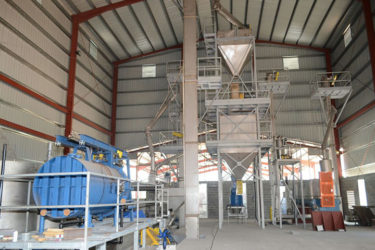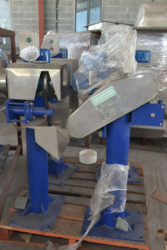A US$6 million investment in the local coconut industry is beginning to take shape at Marudi Creek on the Soesdyke/Linden Highway and if all goes well the new initiative will position Guyana to significantly improve its coconut oil exports in less than a year. Other by-products of coconut will also be produced by the factory for local consumption and export.
The plant and office complex, which when completed will sit on 30 acres of land, is targeted for completion by mid-2017. Immediately thereafter, it will commence production of coconut oil, desiccated coconut, charcoal and coco peat.
Earlier this week, Stabroek Business spoke with 62-year-old Ravi Anand, an accountant by profession, who has been appointed by the investor, Vishnu Ramdeen, to serve as the enterprise’s Chief Executive Officer.
The Marudi Creek operation is the first subsidiary of Precision Global Incorporated, a haulage and real estate company owned by Ramdeen and based in Woodbridge, Ontario. Anand, who is Vice President and Chief Financial Officer of Precision Global told Stabroek Business that both he and Ramdeen will be travelling to Guyana frequently to monitor the progress of the project.
At full throttle, the plant will have 167 employees, including administrative staff and hi-tech machine operators. There will also be opportunities for executive types in various other key areas of the company’s operations.
Anand, who left Guyana on Wednesday to return to Canada had travelled to Guyana to participate in the recently concluded Coconut Festival and to look over the pace of progress at Marudi Creek. He said that both he and Ramdeen thought that it would be a good idea for his visit to coincide the Festival so that he could get feel for the industry.


According to Anand, the Precision Global boss had been contemplating an investment in Guyana for the past five years and finally decided to take the plunge following a visit in October last year. He said that during those five years Ramdeen had been researching the global coconut industry in order to better equip himself to make an informed choice of sector.
Ramdeen, Anand says, has invested in the sector at the right time. So significant is the global demand for coconut and its by-products that he has already secured markets for Precision Global-manufactured coconut oil in both Canada and the United States. He said the current high demand had been triggered by adverse weather conditions in the major coconut-producing countries in Asia, a circumstance that has allowed Precision to cash in on future markets.
The investment decision has not been without its challenges and frustrations, not least among which has been the task of Ramdeen navigating his way through the local investment regime. Some of the key equipment being imported to set up the plant include 40 shell removers, a bucket elevator which will be employed in the grinding, squeezing, pressing and bagging of the coconut for oil extraction, an expeller to remove impurities and a depressor.
Part of the complex has already been built and the bucket elevator has already been installed. The remaining equipment imported so far is being stored in the building. The rest of the land has already been cleared and filled. The immediate priority, Anand says, is fencing the compound and the steel for that exercise has already been imported.
Anand’s assignment has included interfacing with local state agencies concerned with engaging investors including the Guyana Office for Investment (GO-Invest) and the Guyana Revenue Authority (GRA). He says that during his interface with GO-Invest both the agency’s Chief Executive Officer Owen Verwey and Minister of Business Dominic Gaskin have been helpful. He concedes, however, that engagements with some local agencies including Customs and the GRA have not been without hiccups. In one instance and having benefited from a one-year grace period within which to import some equipment he experienced a considerable delivery delay on account of which he had to request that the GRA grant him an extension on the one-year grace period originally allowed. This was not granted. Instead he was required to make a fresh application for another full year.
One very real challenge that lies ahead has to do with ensuring that the plant can secure coconuts to meet its production capacity. Once it swings into full operation the plant will be capable of processing 100,000 coconuts daily, an enormous amount for a local coconut industry facing serious production problems. Anand has visited coconut groves in the Pomeroon, Wakenaam and Berbice but admits that negotiations are constrained by insistence on the part of farmers that the company signs binding contracts long before the delivery days, which also commit to agreed prices. The reason given by the farmers, he says, is that they have been let down in the past by buyers who fail to keep verbal purchasing agreements. Anand says that the company is not prepared to commit to such contracts at this time.
When Stabroek Business spoke with Anand on Tuesday he had only just returned from discussions with a local landowner, which he said could lead to the acquisition of land for the company’s own cultivation project. He says that Precision Global is seeking to control the supply of as high a percentage as possible of the material utilized in the manufacture of its products.
With health considerations having long begun to squeeze the market for sugary and carbonated beverages, Anand says that eventual investment in coconut water is an objective. He declines to talk about the longer-term plans of the company but insists that Precision Global is hoping for a long a mutually rewarding association with Guyana.









